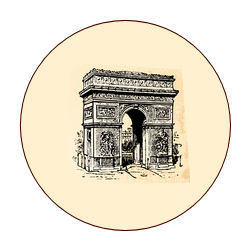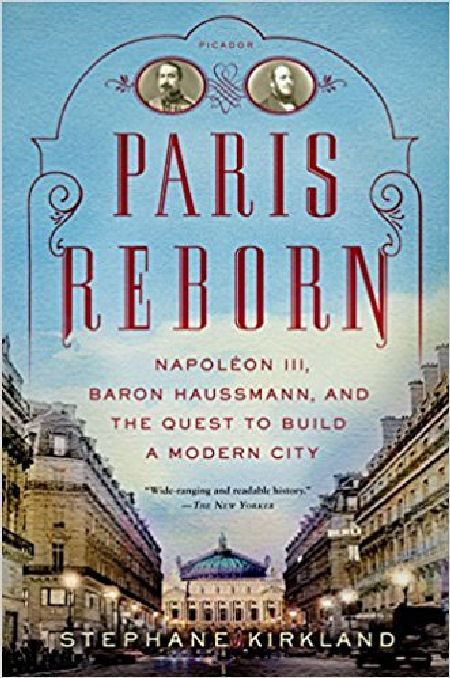|
Paris Reborn:
Napoléon III, Baron Haussmann, and the Quest to Build a Modern City
by Stephane Kirkland
 Paris Reborn: Napoléon III, Baron Haussmann, and the Quest to Build a Modern City Paris Reborn: Napoléon III, Baron Haussmann, and the Quest to Build a Modern City
In the mid-nineteenth century, the Paris we know today was born, the vision of two extraordinary men: the endlessly ambitious Emperor Napoléon III and his unstoppable accomplice, Baron Haussmann. This is the vivid and engrossing account of the greatest transformation of a major city in modern history.
Traditionally known as a dirty, congested, and dangerous city, Paris was transformed in an extraordinary period from 1848 to 1870, when the government launched a huge campaign to build streets, squares, parks, churches, and public buildings. The Louvre Palace was expanded, Notre-Dame Cathedral was restored, and the masterpiece of the Second Empire, the Opéra Garnier, was built. A very large part of what we see when we visit Paris today originates from this short span of twenty-two years.
The vision for the new Paris belonged to Napoléon III, who had led a long and difficult climb to absolute power. But his plans faltered until he brought in a civil servant, Georges-Eugène Haussmann, to take charge of the implementation. Heedless of controversy, at tremendous cost, Haussmann pressed ahead with the giant undertaking until, in 1870, his political enemies brought him down, just months before the collapse of the whole regime brought about the end of an era.
Stephane Kirkland's Paris Reborn is a must-read for anyone who ever wondered how Paris, the city universally admired as a standard of urban beauty, became what it is.
Reviews
• “Wide-ranging and readable history.”—The New Yorker
• “Stephane Kirkland recalls how the City of Light got its luster.”—Vanity Fair
• “Kirkland clearly knows Paris intimately, writes lucid and engaging prose, and is both spirited in his advocacy of Napoléon III and clear-eyed about how he was able to do what he did.”—The Washington Post
• “Scrupulously researched...Fascinating and highly readable, Paris Reborn is strongly recommended for Francophiles, travelers, and students of urban history and planning.” —Library Journal (starred review)
• “Long before Robert Moses set about sculpting New York City, Baron Haussmann--with the blessings of Napoleon III (the Napoleon's nephew)--transformed Paris from a medieval maze into a modern metropolis....Kirkland is an able navigator of architectural history--vivid descriptions abound, and the evolution of the city's infrastructure, public spaces, and other amenities is a testament to the oft overlooked reign of Napoleon III. Lovers of the City of Light and urban planners alike will find Kirkland's survey illuminating.”—Publishers Weekly
• “Stephane Kirkland succeeds in linking strands of politics and finance, to those of history, art and beauty, with a skill that lends his book a most contemporary cutting edge.”—Alistair Horne, author of Seven Ages of Paris
• “Destined to become a classic...Kirkland's authoritative study sparkles with little-known gems...un-put-down-able.”—David Downie, author of Paris, Paris
• “In this richly illustrated, broadly researched volume we follow, step by audacious step, as these two men raze neighborhoods, float bond measures, and, through daring, gamesmanship, even corruption, craft the modern City of Light.”—Penelope Rowlands, author of Paris Was Ours

|
 
Review
According to accepted wisdom, it was Baron Georges-Eugene Haussmann, who during the reign of Emperor Napoléon III was the emperor’s prefect of the Seine district (which included Paris), who wrested the French capital from its centuries-old squalor and transformed it into the Second Empire showcase of monumental beauty that we know today.
Kirkland sees the situation a little differently, preferring to emphasize the importance of the emperor’s own vision for elevating Paris to great heights of beauty and efficiency. In other words, Baron Haussmann actually took his cues from the emperor’s wishes. Consequently, the story that this author tells, infusing a compelling narrative with vibrant information, begins with the advent of Louis-Napoléon Bonaparte, nephew of the first Emperor Napoléon, into French politics as he gained election to the presidency of the Second Republic.
To that office, the junior Napoléon brought not only his distinguished name but also his great ambition for making Paris a capital worthy of French glory. Louis-Napoléon soon declared himself emperor and finally found in Baron Haussmann the man he was looking for, one who was capable of executing the emperor’s grand plan.—Brad Hooper, BOOKLIST
|

